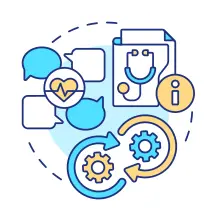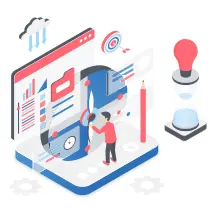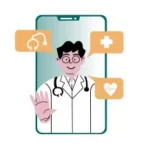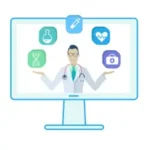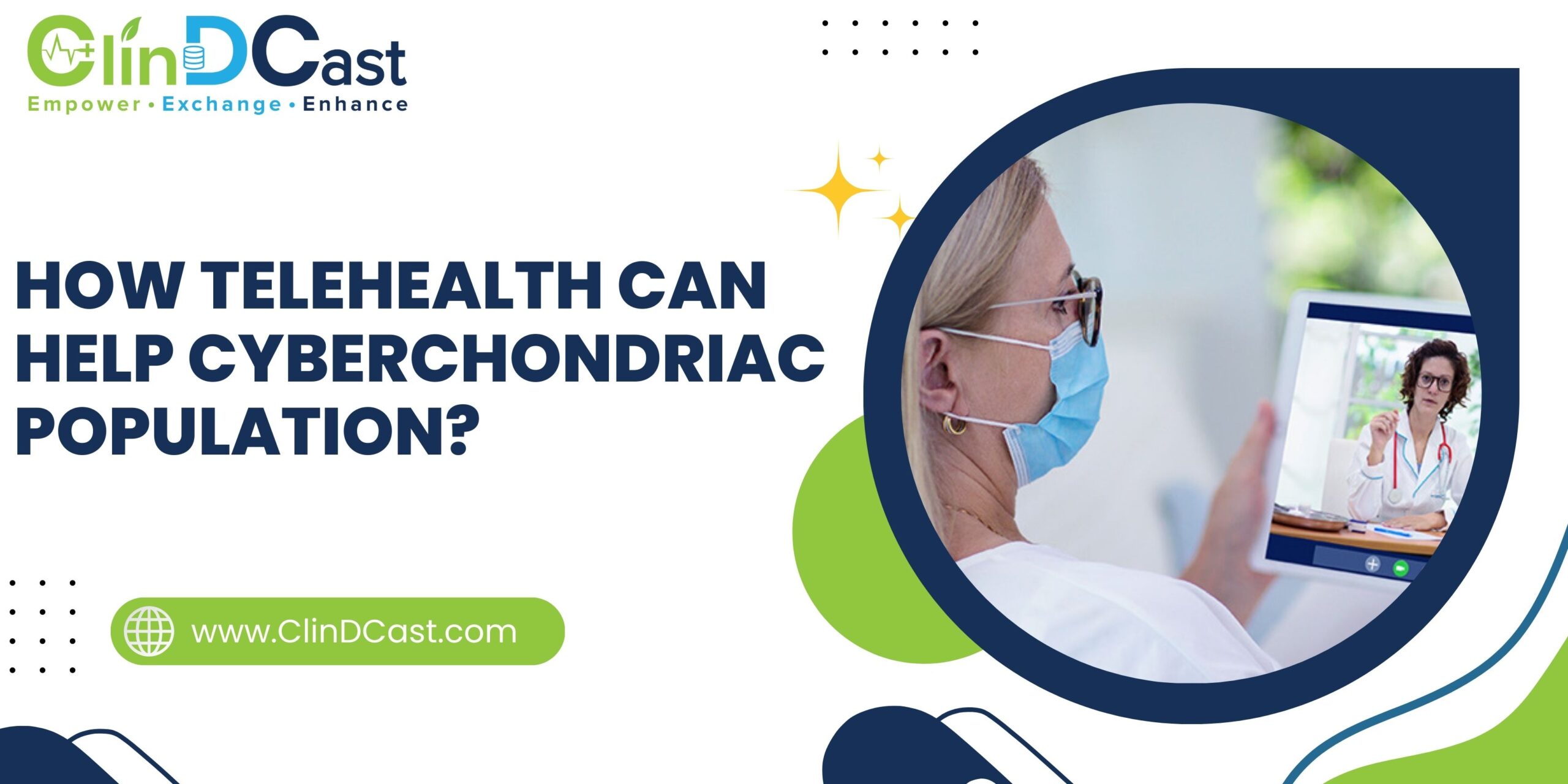
Artificial intelligence (AI) technological breakthroughs are driving a rapid shift in the healthcare sector. AI has the power to completely transform healthcare by enabling more precise diagnosis, individualized therapy plans, and better patient outcomes.
Through improved wellness management, early disease detection, precise diagnosis and treatment, and cost control, artificial intelligence holds great promise for the healthcare industry. While they improve operational efficiency, essential AI features like automated scheduling and claims processing do not significantly alter patient experiences or health outcomes. The potential for advanced AI use cases utilizing robots, analytics, machine learning, and other fields to completely transform healthcare is much bigger.
We will examine Top 5 Advanced AI Use Cases in Healthcare sector in this blog post, emphasizing the revolutionary potential of AI-driven solutions.
Understanding the Role of AI in Healthcare
Healthcare delivery is greatly improved by artificial intelligence in several ways. AI is increasing efficacy and efficiency in a variety of medical settings, from helping physicians with administrative work to interpreting medical scans to provide precise diagnosis. Real-time patient condition monitoring is possible with personalized health applications, and robotic surgery provides previously unheard-of levels of safety and accuracy. AI also speeds up the process of finding new drugs, which results in more effective medicines and treatments.
AI improves patient safety, lowers healthcare costs, and increases access to high-quality care by identifying diseases early, increasing diagnostic accuracy, and suggesting individualized treatment regimens. By offering specialized insights for chronic illness management and prevention, AI has the potential to completely change the way healthcare is delivered when used properly.
Advanced use cases are crucial for advancing innovation in healthcare
Because they provide vital insights and automation capabilities, advanced AI use cases act as drivers for innovation in the healthcare industry. Healthcare professionals can respond sooner and more effectively by utilizing AI for ongoing patient monitoring and early disease identification. Moreover, focused disease prevention methods are made possible by AI-driven predictive analytics, which enhances patient outcomes and lowers healthcare costs.
AI and genomics-powered precision medicine allows for personalized treatment regimens based on each patient’s unique genetic profile, improving patient outcomes and therapeutic efficacy. AI also speeds up the procedures involved in drug development and discovery, which eventually results in the quicker and more effective release of life-saving drugs onto the market.
Top 5 Use cases of AI in healthcare
In the healthcare sector, artificial intelligence (AI) is rapidly advancing patient outcomes, simplifying procedures, and changing the way healthcare is provided. Here are a Top 5 Advanced AI Use Cases in Healthcare.
1. AI-Powered Medical Imaging
Artificial Intelligence (AI) is revolutionizing medical imaging by greatly improving diagnostic efficiency and accuracy. Artificial intelligence (AI) uses sophisticated algorithms to evaluate medical images, including MRIs, CT scans, and X-rays, finding minute anomalies and patterns that human observers could miss. This capacity expedites the diagnostic procedure while simultaneously enhancing accuracy, resulting in more prompt and accurate treatment decisions. Additionally, AI-driven medical imaging systems can help radiologists by pointing out areas of concern or offering second opinions, which will ultimately improve patient outcomes.
2. Predictive Analytics and Disease Prevention
Predictive analytics powered by AI is revolutionizing the prevention of disease by utilizing massive patient data to anticipate health outcomes and hazards. AI algorithms can create customized risk profiles for individuals by examining variables like genetic predispositions, lifestyle choices, medical histories, and environmental effects. Equipped with this data, medical professionals can create customized preventative plans that cater to the individual requirements of every patient. These tailored interventions, which range from preventative screening procedures to lifestyle changes, not only enhance health outcomes but also result in significant cost savings by averting expensive hospital stays and treatments.
3. Precision Medicine and Genomics
Realizing the full potential of precision medicine, which is a paradigm change in healthcare, depends heavily on artificial intelligence. Artificial intelligence (AI) systems are able to recognize genetic variants linked to certain diseases or treatment responses by mining and analyzing large genomic databases. With this information, medical professionals may customize treatment regimens based on each patient’s unique genetic profile, optimizing therapeutic efficacy and reducing side effects. AI-powered precision medicine promises to transform patient care by providing genuinely tailored and targeted solutions for everything from rare genetic illnesses to cancer therapy.
4. AI in Drug Discovery and Development
The lengthy and expensive drug discovery process is well-known, but artificial intelligence (AI) has the potential to change this. AI speeds up the entire drug discovery and development process, from target identification to clinical trials, by utilizing machine learning algorithms. Large-scale biological data can be analyzed by AI algorithms to find promising drug candidates, forecast their safety and efficacy characteristics, and even improve the layout of clinical trials. This simplified method lowers expenses, raises the possibility of success, and quickens the pace of medication development. In the end, AI-driven drug discovery has the potential to expedite and improve the time it takes to bring life-saving drugs to market.
5. Robotics and Surgical Assistance
Artificial intelligence (AI)-enabled robots is transforming the surgical sector by providing unmatched safety, control, and precision. Surgeons can perform less intrusive surgeries with better results by combining robotic devices with AI algorithms. These AI-powered surgical helpers lower the possibility of problems and human mistake by performing intricate procedures with unparalleled accuracy. Furthermore, AI navigation technologies give surgeons immediate feedback and direction, improving their situational awareness and decision-making skills. Patients having AI-assisted procedures consequently benefit from quicker recovery periods, fewer problems, and better overall results.
How does AI improve patient care in healthcare?
AI improves patient care by facilitating more precise diagnosis, individualized treatment regimens, and ongoing condition monitoring. Better patient outcomes result from the streamlined administrative procedures, less diagnostic errors, and facilitated early disease diagnosis.
What are the challenges and ethical considerations associated with AI in healthcare?
Concerns around data security and privacy, possible biases in AI algorithms, a lack of transparency in the decision-making process, and legal compliance are some of the difficulties. Assuring patient permission, treating patients fairly, and providing everyone with equal access to AI-driven healthcare services are all ethical concerns.
How can healthcare professionals leverage AI effectively?
Healthcare workers can effectively use AI by keeping up with the most recent developments in the field, receiving training to help them integrate AI solutions into their work, and working with data scientists and AI developers to customize AI tools to fit the needs of individual patients.
How can patients benefit from AI in healthcare?
AI in healthcare can help patients by providing them with better access to early and accurate diagnosis, individualized treatment plans, remote monitoring of medical conditions, and preventive measures to prevent disease. AI-powered solutions also provide patients greater control over how they manage their health and wellbeing.
Conclusion: Embracing AI for Smarter Healthcare
While AI in healthcare is still in its infancy, it has enormous potential to propel more intelligent, long-lasting advancement. We can advance toward a future where illness treatment is not given priority over wellbeing optimization by carefully incorporating AI into individualized, precision-based health management. Artificial Intelligence (AI) holds great promise to improve healthcare outcomes, experiences, economics, and equity through ethical innovation and application.

